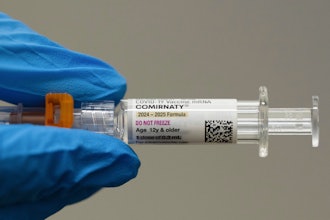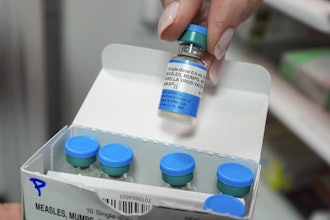
Reach Neuro, a neurotechnology company giving control and independence back to people with debilitating neurological disorders, announced today that it has been granted a Breakthrough Device designation by the U.S. Food and Drug Administration (FDA) for its Avantis platform. Avantis uses small electrical impulses delivered to the spinal cord to help restore shoulder, arm, and hand movement to individuals with impairment due to chronic stroke. The FDA Breakthrough Device designation recognizes the importance of bringing this technology to clinics quickly to address an enormous un-met need for the nearly 7.5 million Americans living with post-stroke disability.
In the U.S., an estimated 800,000 people per year have a stroke, and nearly half will experience some form of long-term paralysis as a result of permanent damage to the brain's ability to send signals to muscles. Today, there is no standard of care for these individuals—many of whom struggle to obtain insurance coverage for post-acute physical or occupational therapy due to a lack of evidence that such therapy provides benefit after the first 3-6 months post-stroke. Reach Neuro's Avantis system directly restores a patient's ability to control movement, not only giving immediate relief, but also making it possible to return to therapy and continue making even further improvements.
Reach Neuro was founded in 2021 as a spinout company of the University of Pittsburgh and Carnegie Mellon University, where the technology is currently being tested in an NIH funded clinical trial in collaboration with the University of Pittsburgh Medical Center (UPMC). The team recently published a manuscript in the journal Nature Medicine, describing the results from the first two study participants. In the study, subjects showed 40% and 108% improvements in grip strength respectively, and up to 124% improvement in joint strength. These improvements enabled them to perform reaching movements more quickly and smoothly than without stimulation (30-40% faster). Participants were also able to perform functional tasks like lifting objects, eating with a fork, and opening a lock. Surprisingly, the researchers observed that some improvements were retained up to one month after the study, even without stimulation. However, patients will likely benefit from having the implant chronically.
"We are excited about the FDA's recognition of our technology's potential to change the lives of millions of people living with disability," said Marc Powell, Ph.D. CEO, Co-Founder of Reach Neuro. "The Breakthrough Device designation is an incredible opportunity to work closely with FDA experts to expedite the clinical translation of the Avantis system."
Current treatments for stroke focus only on the acute phase of recovery and approximately 50% of stroke survivors are left with disabilities that are considered permanent. However, early evidence shows that the Avantis system can be effective in chronic stroke patients even up to 9 years after their stroke, which is well outside the 6 month window in which existing therapies are used. The stimulation empowers stroke patients to regain use of their arm and hand, strengthening muscle activity without imposing unintended movements.
Heather Rendulic, the first participant in the university-lead clinical study describes her experience with the device: "Having the stimulation working and being able to move my arm/hand again after 9 years was one of the most surreal experiences of my life—it was as if my brain was in control of my arm again. This technology gave me such immense hope that one day I will regain a sense of independence again. This will change the lives of millions of people!"
Reach Neuro is an alumni of SOSV's IndieBio startup development program, which mentors, scales, and invests in early-stage life sciences startups building the future of planetary and human health. With the FDA Breakthrough Device status, the company intends to accelerate the regulatory process for its Avantis platform through close collaboration with the agency, to make their shared goal—changing the narrative around chronic stroke—a reality.






















